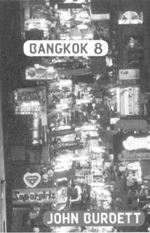BANGKOK 8
John Burdett
New York: Alfred A. Knopf, 2003
318 pp.; $24.00 (cloth)
Tailing an American suspect through the gridlocked streets of Bangkok, a Thai policeman witnesses his partner’s gruesome murder. What would Buddha do?
John Burdett’s Bangkok 8 tells the story of Sonchai Jitpleecheep, a police detective in Bangkok’s eighth precinct determined to avenge his partner’s death. But Sonchai is no ordinary policeman. He is an arhat, a former Buddhist monk exiled to the police force by his abbot to work off some troubling karma. To Sonchai, Buddhism is not an exotic faith; it is the constant backdrop of his daily life, a simple fact of his existence. He acknowledges that not everyone sees things this way, as he explains to the reader early on:
Every man [in Thailand] has ordained as a monk for at least three months of his life, meaning that every man has seriously contemplated the inevitability of his own death, the corruption of the body, the worms, the disintegration, the meaninglessness of everything except the Way of the Buddha. We do not look on death the way you do, farang [foreigner]. My closest colleagues grasp my arms, and one or two embrace me. No one says sorry. Would you be sorry about the sunset?
The cliché of Buddhist fiction in the West is the spiritual quest: a naive student stumbling toward nirvana. If we encounter an enlightened being in literature, it is usually an inscrutable master who kindly helps our hapless hero along the path. In breaking the mold and telling this engaging story entirely through the awakened eyes of Sonchai, Burdett is able to present even obscure Buddhist beliefs as ordinary reality.
As we descend deeper into the bizarre conspiracy involving drugs, jade, and prostitution that Sonchai is investigating, we discover that he sees the past lives of people he meets as readily as an American policeman might note their height and weight. The brother of a murdered U.S. Marine is introduced to us as “the reincarnation of a Southern planter who treated his slaves well but was unable to transcend the racism of his times.” When a female FBI agent arrives in Thailand to assist in the investigation, Sonchai informs us that she was a housewife who poisoned her husband in a previous lifetime, while one of her colleagues in the Bureau was the womanizing gangster she had killed. (That’s why the two don’t get along in their current incarnations, Sonchai deduces, although he wisely chooses not to explain this to the agent.)
Waking up in a strange room, Sonchai is unfazed by the sight of a hungry ghost at his feet:
It is male, about nine feet tall with the round shape of a tick, tiny feet and legs. His mouth is the size of the eye of a needle, just as the tales stipulate. I have seen his kind too often to be truly frightened. . . . He is the spirit of one who was greedy and selfish in his lifetime and must spend a thousand years with that tiny mouth which can never take in enough food for that huge body.
It is refreshing to read about Buddhism not as some mystical Other, but as the everyday reality of a Thai man steeped in its traditions. At first, Sonchai’s pronouncements from the other shore are a little jarring, but in time we become accustomed to a world in which past lives are as apparent as hair styles, and hungry ghosts forage for food like ravenous rats. We accept Sonchai’s Buddhist world and follow him eagerly through the intricacies of the case.
Sadly, despite many wonderful moments, Bangkok 8 begins to deteriorate about two-thirds of the way through, when the storyline becomes so convoluted it borders on self-parody. The twists and turns include a stale CIA conspiracy, a group of Russian prostitutes, and not one but two sex-change operations. This silliness is disappointing, especially in the midst of such an innovative weaving of narrative and dharma. With some judicious cutting of the more outrageous plot devices, this quite good Buddhist novel could have been a great one.
Still, Burdett achieves a lot, exploring the finer points of Thai culture and Buddhism, bringing the city of Bangkok itself alive as a vibrant character, and convincingly portraying the inner life of a very likable, enlightened detective. Much of Bangkok 8 is a joy to read. It would be hard not to warm to a novel that, despite its flaws, reminds us: “Everyone has a spiritual dimension, even cops. Even crooks.”
Thank you for subscribing to Tricycle! As a nonprofit, we depend on readers like you to keep Buddhist teachings and practices widely available.